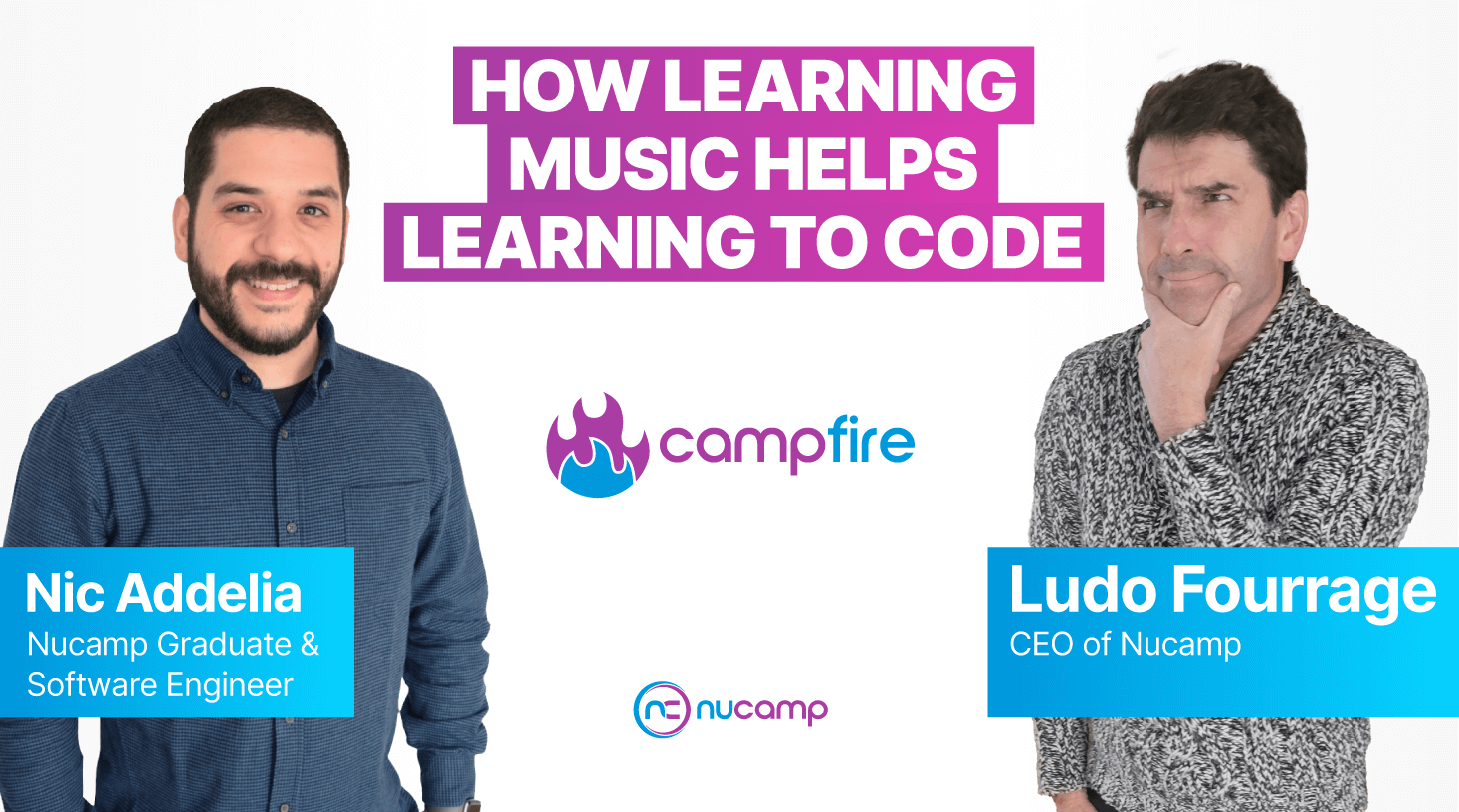Watch the first Nucamp Campfire episode.
Last Updated: January 23rd 2023

On episode #1 of Campfire, Nucamp's CEO was joined by Nucamp Graduate and now Software Engineer, Nic Addelia.
In April 2021, Nic Addelia was featured in a Student Spotlight for an inspiring look into his story.
Ludo then invited Nic onto Campfire for a look deeper into his journey to becoming a Software Engineer and for a chance for viewers to ask Nic questions themselves.
Nic brought palatable energy and valuable advice to the show.
If you didn’t get a chance to watch the live inaugural Campfire episode or missed Nic’s Student Spotlight, Nic began his career as a high school Band Director and kept his childhood interest in coding as a hobby.
After six years in education, he decided to make a change and flip his hobby into a career, and vice versa.
Self-studying code for years wasn’t giving him the results he wanted and he decided to amplify his learning with a coding bootcamp.
In 2020 he registered at Nucamp and went on to graduate with honors from both the Front End and Full Stack Bootcamps.
Nic’s strategy to start over after already earning and using his Music Education degree is commendable with the uncertainty of what lies ahead in many industries.
As more professionals look to improve their situations, it is becoming more prevalent than ever in the coding world for those without Computer Science degrees to find success transitioning into coding careers.
Here are some of the great questions and insights taken away from Ludo’s chat with Nic:
Why did you choose a career in music education first?
“Even though the subject matter of both fields are so different, as I went back to school for programming I found many parallels. There are a lot of similarities between both music and coding careers in that they revolve around problem-solving. Those that excel most in these fields are great at problem-solving in groups, e.g., those willing to study together, work on problems together, make music together. Communication and thinking on your feet without being afraid to make mistakes and learn from them are crucial in both fields.”
Did you use the similarities you saw between your music background and coding to stand out in interviews?
“Yes, I think if you are able to show you are pulling in skills from a different career and leverage that in your coding career, it’s very valuable. Coming to an interview with concrete examples of transferable skills from your past jobs is very helpful to bridge the gap if you don’t have a background in tech.”
What made you decide to want to transition away from your music career into coding?
“It was a slow transition, but I knew I wanted my career itself to change, but I didn’t want my passion for my work to change. I figured if I was able to move forward with a full-time role in tech and still pursue music on the side, I would be happy. I wanted to find a way to turn coding into a full-time career and still perform and write music and teach lessons on the side.
There were several years leading up to me joining Nucamp where I was trying to learn things on the side and build up my skill set. Yes, there are free resources online, but I fell into the typical “tutorial hell” where I wasn’t progressing.
It was recommended to I go back to school, but I wasn’t willing to quit the job I liked in hopes of something maybe panning out 5+ months later. Nucamp relieved that stress by letting me keep my job while studying. Joining Nucamp launched me forward after feeling like I kept reading the same tutorials over and over.”
How did you manage your time studying around your job and family?
“I made sure to let my family know the time commitment I needed to accomplish my goals and approached studying with Nucamp just as seriously as when I was in college for my Music Education degree. I set aside time to plan each week and front-loading or back-loading my course work based on work and family schedules. There were some weeks I had to stay up late when the coursework was more challenging. It was a lot of work, but it was reasonable. Being able to pace how I needed to during the week made it so if something came up on Monday I could work extra the next day to make up for it.
Again, I made sure to continue to communicate with my wife and friends if I needed extra space in my schedule to study.”
How do you break out of the mindset of people who try to tell you you’re too old to start or not able to get into tech later in your career?
“You need to find people outside of that mindset and surround yourself with people who are open-minded and excited about growth. Find people who are going to support you and help you along the way, no matter your age or experience level.”
Watch the full Campfire episode:
Samantha Anderson
Marketing Manager
Part Illustrator, part Graphic Designer, and part Digital Marketer—with a sprinkle of sales savvy and a dash of empathy. I'm all about using my creativity to craft captivating stories through both illustration and writing. When I'm not at my computer, you'll find me drawing nature inspired patterns and portraits on my other favorite screen: my iPad. To keep myself inspired (and to get away from my slight tech addiction) I garden, golf, and go on nature walks with my dog and cat leading the way.


